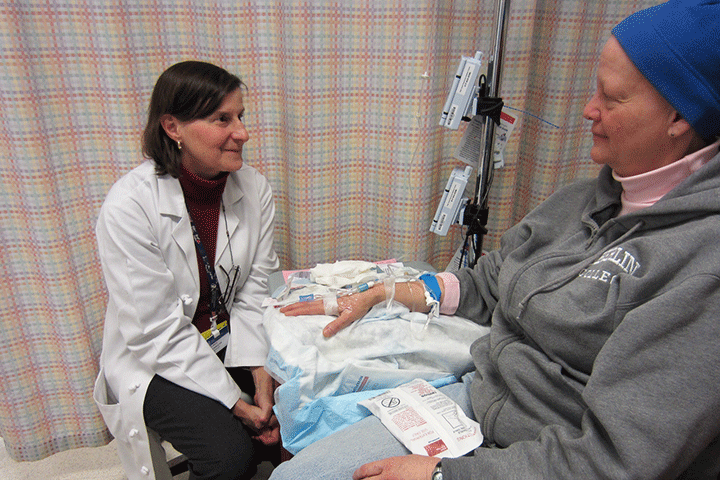Traveling with Pancreatic Cancer

Dr. Sunil Hingorani; Dr. David Zhen
When you receive a pancreatic cancer diagnosis, taking a lavish vacation may not seem like a savvy treatment strategy. Yet a growing number of doctors are prescribing travel to patients who enjoy seeing the world.
“The goal is to build care around the patient’s priorities,” explains Sunil R. Hingorani, M.D., Ph.D., formerly with the Fred Hutchinson Cancer Research Center and former Founding Director of the Pancreas Cancer Specialty Clinic at Seattle Cancer Care Alliance. (Hingorani is now at the University of Nebraska Medical Center, Omaha). So, yes, you can and should take that coveted trip to Europe. It’s your provider’s responsibility to build in treatment breaks and change your dosing schedule accordingly.
In fact, studies show that travel for cancer patients is associated with better outcomes—and not because patients are traveling for their care.
Safe Travel Strategies
Traveling with pancreatic cancer isn’t always seamless, but for many patients, the experience is worth the extra headaches. Whether you’re traveling to spend time with family or see the world and all it has to offer, these 10 strategies can help you navigate the challenges that come your way.
Plan ahead. As soon as you make the decision to travel, start thinking about logistics. “Have a discussion with your physician where you make a plan for the worst-case scenario,” suggests David Zhen, M.D., medical oncologist at the Seattle Cancer Care Alliance and an Assistant Professor of Medicine at the University of Washington. “Having a plan in place can help you feel more comfortable with travel.” Depending where you’re traveling, your doctor may even be able to provide a contact number or the name of an institution where you can get care should the need arise.
Bring documentation. Ask your doctor to print a summary of your medical condition, allergies, medications, and treatment plan. That way, you have documentation available should you need to meet with a medical team at your destination.
Carry medications. Instead of packing your meds in checked luggage, keep all prescription medications, supplements, and over-the-counter aids in a carry-on bag. In fact, consider bringing along medication for every potential problem, including pain medication, anti-nausea meds, and steroids.
Drink up. It’s important to stay hydrated throughout your travels, particularly when you’re taking multiple medications. “If you’re traveling outside the country, be sure to drink bottled water,” says Zhen.
Focus on food. Eat whatever you want. If you’re traveling in foreign lands with foods you don’t like or recognize—or on airplanes with terrible food—bring calorie-dense snacks you can munch on in a pinch.
Talk to your doctor. Make sure your doctor clears you for travel and ask if there are things you can do to reduce your risk of complications. If your blood counts are down, or your treatment plan is particularly grueling, travel may increase your risk of contracting illness or infection. You may need vaccinations to travel to certain destinations. And if you’re traveling by air, your doctor may prescribe medication to prevent clot formation. (Air travel increases the risk of blood clots, a risk that’s already elevated among pancreatic cancer patients.)
Get travel insurance. Travel insurance can offer a safeguard in case you’re unable to make your trip at the last minute. Most credit card companies offer travel insurance when you pay for the trip with their card. The caveat: Be sure to check the policy to make sure it covers pre-existing conditions (such as pancreatic cancer).
Ask for help. Don’t be afraid—or ashamed—to ask for special accommodations both in the airport and when you reach your final destination. Will a wheelchair make it more comfortable for you to get the gate? Call the airline in advance. Will extra pillows offer you more support when you sleep? Ask the hotel clerk to stash extras in your room. Most hospitality managers are more than happy to make arrangements to ensure you have a comfortable and enjoyable stay.
Protect yourself. Make sure you pack a broad-brimmed hat, sunscreen, bug repellent, and other essentials to protect yourself from the sun and other holiday hazards. If you have undergone chemotherapy, or if you’re taking other medications, your skin may be more sensitive.
Have fun! “As best as you can, try not to think about your cancer while you’re on vacation,” says Hingorani. Instead, relax, enjoy, and focus on making memories. These memories are not just important for the patient, but for his or her loved ones as well.
Travel for pleasure offers your body a break from treatment while also bolstering your spirits. A bonus: You may have the opportunity to sample local cuisine, indulge in your favorite foods, and experience a few “first” adventures.
Traveling for Care
Some pancreatic cancer patients choose to travel from home to get treatment or participate in a clinical trial. According to a study published in the Journal of the American College of Surgeons, about 25 percent of the nearly 23,000 pancreatic cancer patients studied traveled for these reasons. But many of the same tips for leisure travel also apply when traveling for treatment.
If you’re traveling for care, consider whether there are options close to home first. “Unless there’s a really compelling reason to go to an institution far away, I don’t encourage patients to leave their home environment,” says Hingorani. “The best ideas in pancreatic cancer care are being tested in multiple places.”
Chances are, you can find leading edge care near your home turf where you have support from friends and family—and can also visit your favorite local coffee shop!





